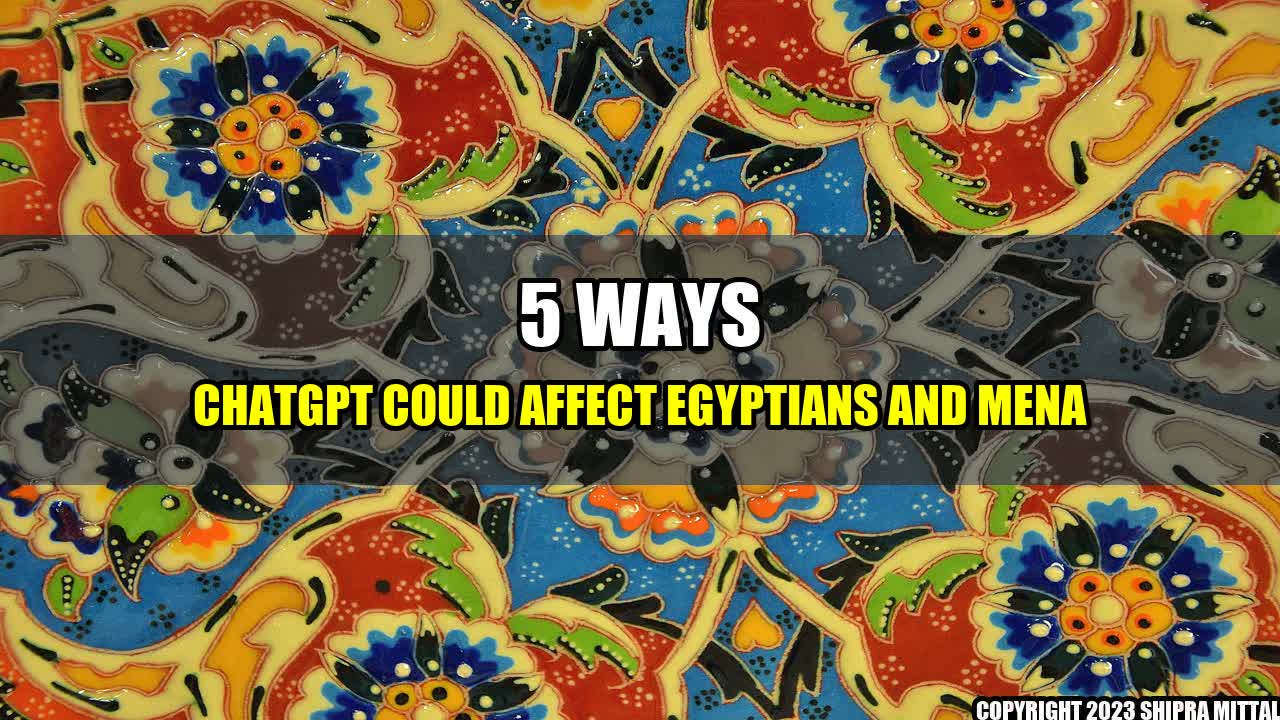
Once upon a time, there was a young man from Egypt named Ahmed. He had a passion for technology and always wanted to create something innovative. While exploring the internet one day, he came across ChatGPT, a chatbot that uses artificial intelligence (AI) to converse with users and provide them with knowledge on various topics.
Ahmed was intrigued and decided to test out the chatbot. He was amazed at the depth of knowledge the app possessed. With just a few clicks, he could access information on anything and everything he wanted to know, from science and technology to history and culture.
That's when it hit him. With ChatGPT, he could bring about a positive change in his community and the larger MENA region. Here are five ways in which ChatGPT could affect Egyptians and MENA:
Education is the backbone of any society. Unfortunately, access to quality education remains a challenge for many families in Egypt and across the MENA region. With ChatGPT, however, students and learners of all ages can gain access to high-quality educational resources and even receive personalized learning experiences tailored to their unique needs and learning styles.
For instance, ChatGPT can provide students with study tips, practice materials, and guidance on how to tackle difficult concepts. With its vast knowledge base, ChatGPT can also help learners discover and explore new areas of interest, thereby expanding their horizons and fostering a lifelong love of learning.
Another area where ChatGPT could bring about significant change is in the realm of healthcare. Many people in Egypt and MENA lack access to quality healthcare due to a shortage of doctors and medical facilities, as well as long wait times for appointments. ChatGPT, with its ability to provide instant and accurate information on health-related topics, could help individuals better understand their health needs and take control of their well-being.
Furthermore, ChatGPT can help patients and caretakers stay up-to-date on the latest health news and developments, receive useful tips on healthy living, and even speak with medical professionals to get personalized advice on their health concerns. With ChatGPT, the need for frequent visits to the doctor could be considerably reduced, saving both time and resources.
The MENA region often faces challenges in terms of economic growth and development. However, ChatGPT could play a vital role in empowering businesses and entrepreneurs by providing access to valuable insights and knowledge. Through ChatGPT, entrepreneurs and business owners can learn about different business strategies, market trends, and industry best practices that can help them make informed decisions and grow their businesses sustainably.
Moreover, ChatGPT can also serve as a platform for financial education, an area often lacking in the region, with many people unaware of how to manage their finances effectively. By providing up-to-date information on financial products, investment strategies, and savings tips, ChatGPT could help individuals improve their financial literacy and make informed decisions that can improve their financial well-being.
Climate change and environmental degradation are increasingly major threats to the MENA region's sustainable development. With its ability to reach mass audiences and its broad knowledge base, ChatGPT could play a vital role in raising awareness about these critical issues. By providing access to information on environmental conservation, green lifestyles, and climate change mitigation, ChatGPT could inspire individuals to take action and make a difference in their communities.
In addition, ChatGPT could also encourage individuals to adopt more sustainable habits, such as reducing water consumption, energy consumption, and waste production. By promoting sustainable living, ChatGPT could help protect the region's natural resources and preserve its beauty for future generations.
Finally, ChatGPT could help foster improved cultural understanding and appreciation in the region. The MENA region is renowned for its diverse cultures, traditions, and religions. Yet, in many cases, misunderstandings and conflicts arise due to a lack of knowledge and understanding. Through ChatGPT, people can discover and explore the rich history, art, literature, and culture of the region and learn to appreciate and respect its diversity.
Furthermore, ChatGPT could also serve as a platform for language learning, enabling individuals to learn and practice different languages spoken in MENA, including Arabic, Farsi, and Turkish. By promoting cross-cultural communication and understanding, ChatGPT could contribute to a more peaceful and inclusive society.
In conclusion, ChatGPT has the potential to bring about significant changes to the MENA region by improving access to education, healthcare, and financial literacy while also promoting sustainable living, cultural understanding, and environmental conservation. However, the success of ChatGPT will also depend on how the technology is implemented and how receptive people are to it.
It is important to note that ChatGPT is not a substitute for human interaction and expertise. Instead, it is a tool that can complement and enhance the knowledge and skills of individuals and institutions in the MENA region.
Ultimately, the success of ChatGPT in the MENA region will depend on how well it serves the people and responds to their unique needs and challenges. By leveraging this technology and working together to tackle pressing issues, we can create a brighter future for generations to come.
Society & Culture, Technology
Curated by Team Akash.Mittal.Blog
Share on Twitter Share on LinkedIn